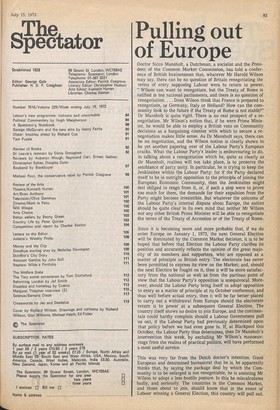I Pulling out of Europe
Doctor Sicco Mansholt, a Dutchman, a socialist and the President of the Common Market Commission, has told a conference of British businessmen that, whatever Mr Harold Wilson may say, there can be no question of Britain renegotiating the terms of entry supposing Labour were to return to power. "Wilson can want to renegotiate, but the Treaty of Rome is ratified in ten national parliaments, and there is no question of renegotiation.... Does Wilson think that France is prepared to renegotiate, or Germany, Italy or Holland? How can the community look to the future if the Treaty of Rome is not stable?" Dr Mansholt is quite right. There is no real prospect of a renegotiation. Mr Wilson's notion that, if he were Prime Minister, he would be able to employ a British veto on Community decisions as a bargaining counter with which to secure a renegotiation makes little sense. As Dr Mansholt says, there can be no negotiation, and the Wilson notion is clearly shown to be yet another papering over of the Labour Party's European cracks. What the Labour Party's leader is endeavouring to do, in talking about a renegotiation which he, quite as clearly as Dr Mansholt, realises will not take place, is to preserve the semblance of party unity. In particular, he is trying to keep the Jenkinsites within the Labour Party: for if the Party declared itself to be in outright opposition to the principle of joining the European Economic Community, then the Jenkinsites might feel obliged to resgn from it, or, if such a step were to prove too much for them, the demands for their expulsion from the Party might become irresistible. But whatever the outcome of the Labour Party's internal dispute about Europe, the nation should be quite clear in its own mind that neither Mr Wilson nor any other British Prime Minister will be able to renegotiate the terms of the Treaty of Accession or of the Treaty of Rome.
Since it is becoming more and more probable that, if we do enter Europe on January 1, 1973, the next General Election will be dominated by the Common Market decision, it is to be hoped that before that Election the Labour Party clarifies its position and accurately reflects the opinion of the great majority of its members and supporters, who are opposed as a matter of principle to British entry. The electorate has never been permitted to express its view on the Market; and, should the next Election be fought on it, then it will be more satisfactory from the national as well as from the partisan point of view that the Labour Party's opposition is unequivocal. Moreover, should the Labour Party bring itself to adopt opposition to entry as a matter of principle at its October conference, and thus well before actual entry, then it will be far better placed to carry out a withdrawal from Europe should the electorate return it to power at a subsequent General Election. The country itself shows no desire to join Europe, and the continentals could hardly complain should a Labour Government pull us out, if the Labour Party had previously determined upon that policy before we had even gone in. If, at Blackpool this October, the Labour Party thus determines, then Dr Mansholt's intervention this week, by excluding Mr Wilson's manoeuvrings from the realms of practical politics, will have performed a most useful service.
This was very far from the Dutch doctor's intention. Good European and determined bureaucrat that he is, he apparently thinks that, by saying the package deal by which the Community is to be enlarged is not renegotiable, he is assisting Mr Wilson to adopt a less hostile posture. In this he miscalculates badly, and seriously. The countries in the Common Market, and those about to join, should know that in the event of Labour winning a General Election, this country will pull out.










































 Previous page
Previous page